Hunter Class FFG
| Type | Frigate, Guided Missile (FFG) |
|---|---|
| Roles |
|
| Builder | BAE Systems Maritime Australia /ASC Shipbuilding |
| Displacement | Stability Lightship 8,167 tonnes (Feb 23) |
| Length | 149.9 metres |
| Beam | 20.8 metres |
| Propulsion | Combined Diesel Electric or Gas (CODLOG) |
| Speed | 27+ knots (top speed) |
| Range | 7000nm (electric motor drive) |
| Weapons |
|
| Aircraft | 1 x MH-60R helicopter |
| Company | 183 crew not including embarked flight. Accommodation for up to 208. |
| Fact Sheet | Hunter Class FFG (PDF, 3.4MB) |
| News Articles | Defence News |
BAE System’s Global Combat Ship - Australia will be one of the most advanced anti-submarine warships in the world. The Hunter Class FFGs will be built in Australia by ASC Shipbuilding at the Osborne Naval Shipyard in South Australia.
The Hunter Class will provide the Australian Defence Force with the highest levels of lethality and deterrence our major surface combatants need in periods of global uncertainty. They will have the capability to conduct a variety of missions independently, or as part of a task group, with sufficient range and endurance to operate effectively throughout the region. The frigates will also have the flexibility to support non-warfare roles such as humanitarian assistance and disaster relief.
Incorporating the leading edge Australian-developed CEA Phased-Array Radar and the US Navy’s Aegis combat management system, with an Australian interface developed by Saab Australia, the Hunter Class will be one of the most capable warships in the world.
The first three ships of the Hunter Class will proudly carry the names of three major Australian regions, all with strong historical maritime and naval ties. HMA Ships Flinders (II) (SA region named for explorer Captain Matthew Flinders - first circumnavigation of Australia and identified it as a continent); Hunter (NSW region named for Vice-Admiral John Hunter - first fleet Captain and second Governor of NSW); and Tasman (state and sea named for explorer Abel Tasman - first known European explorer to reach Tasmania, New Zealand and Fiji). The class name was specifically chosen for the alternate interpretation of a ‘hunter’ personifying the role of the frigates as a submarine hunter, with the term embodying the pursuit of prey.
The Hunter Class will begin entering service in the early 2023 replacing the 8 Anzac Class frigates, which have been in service since 1996.





